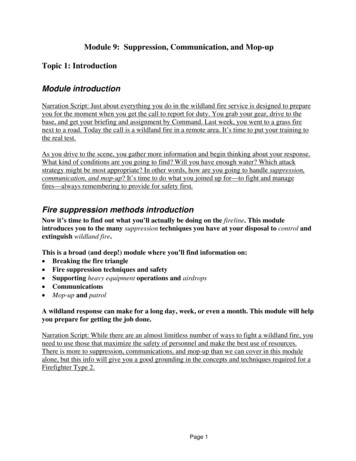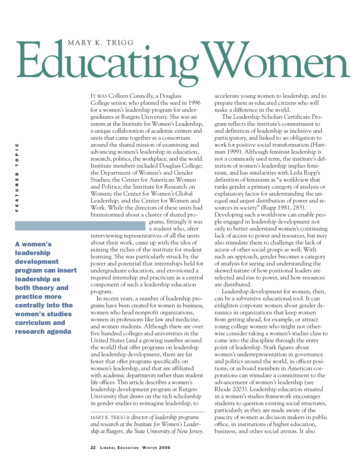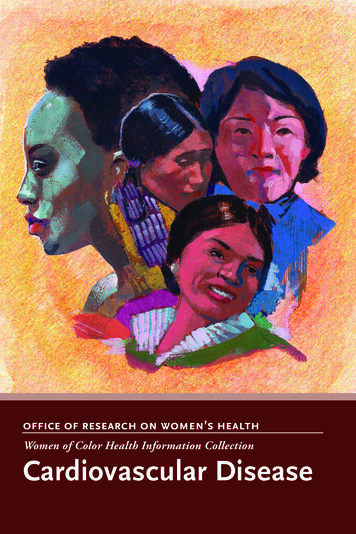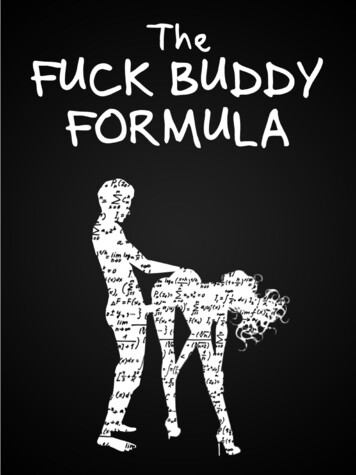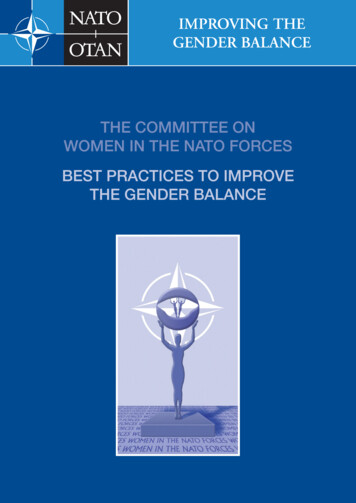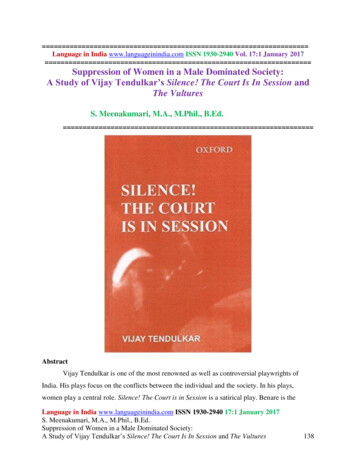
Transcription
Language in India www.languageinindia.com ISSN 1930-2940 Vol. 17:1 January 2017 Suppression of Women in a Male Dominated Society:A Study of Vijay Tendulkar’s Silence! The Court Is In Session andThe VulturesS. Meenakumari, M.A., M.Phil., B.Ed. AbstractVijay Tendulkar is one of the most renowned as well as controversial playwrights ofIndia. His plays focus on the conflicts between the individual and the society. In his plays,women play a central role. Silence! The Court is in Session is a satirical play. Benare is theLanguage in India www.languageinindia.com ISSN 1930-2940 17:1 January 2017S. Meenakumari, M.A., M.Phil., B.Ed.Suppression of Women in a Male Dominated Society:A Study of Vijay Tendulkar’s Silence! The Court Is In Session and The Vultures138
protagonist of this play. The play exposes the hypocrisy and cruelty of all male characters againstthe protagonist Benare. Judicial court is supposed to be a seat of justice, seriousness anddecorum. The play mocks at the judicial system. The play depicts the tragedy of an individualwho is victimized by the society. Finally, in a state of desperation, she consumes poison and dies.In the other play The Vultures tells about the unmitigated violence arising from greed andimmorality. It portrays the domestic violence caused by greed. The selfishness and greed ofhuman beings are the main issues of the play. Rama and Manik are the two women characters ofthe play. These women characters suffer in the hands of men. Violence is the main theme of theplay. Thus, the playwright Vijay Tendulkar clearly depicts the suppression of women in maledominated society in his plays Silence! The court is in session and The Vultures.Key Words: Suppression, Judicial system, Domestic Violence, Silence! The Court is in Session,The Vultures.IntroductionLiterature is broadly defined as anything that is written. There are a few characteristicfeatures that differentiate literature from other writing. In a literary piece of writing, language ishandled with extreme care to drive at the desired effect. It is written in any one literary genre likepoetry, prose, fiction or drama. It expresses ideas of permanent or universal interest.Drama is meant for a live performance. It communicates in the present. Even, an illiteratecan watch a drama, get educated and entertained from it. The action in drama plays a crucial role.But, in other genres, words are more important. In drama, even if an audience misses a word, hecould make out the meaning from the gestures and the acting of the artists.Patriarchy is a system whereby women are kept subordinate in a number of ways. Thesubordination that women experience at a daily level, regardless of the class they might belong totakes various forms of discrimination, disregard, insult, control, exploitation, oppression,violence within the family, at the place works, in society.Language in India www.languageinindia.com ISSN 1930-2940 17:1 January 2017S. Meenakumari, M.A., M.Phil., B.Ed.Suppression of Women in a Male Dominated Society:A Study of Vijay Tendulkar’s Silence! The Court Is In Session and The Vultures139
Vijay Dhondopant Tendulkar (1928-2008) is one of the best known playwrights inmodern Indian theatre. He was born on 6th January 1928. He has been the leading playwright ofMarathi for more than fifty years. He started his career as a dramatist with his play Shreemant in1955. Tenulkar's eight plays are translated into English. They are Silence! The Court is inSession (1968), Encounter in Umbugland (1969), The Vultures (1972), Sakharam Binder (1972),Ghashiram Kotwal (1972), Kamala (1982), A Friend’s Story (1982), Kanyadaan (1983).Male Dominance in Silence! The Court is in SessionIndian Civilization has an unquestioned practice of treating women as the secondary selfwho has to dance to the tune of man’s lyric as regards their choice, belief and life style.Tendulkar treats his female protagonists with a great comprehension and sympathy. His femalecharacters reveal his intensive treatment of themes like social conscience and complex humanrelationships.In patriarchal culture, power is equated with aggression and masculinity, weakness withcompassion and feminity. Women are supposed to bear male oppression silently and meekly.The purpose of this oppression is to obtain psychological ego satisfaction and strength and selfesteem. Since this question of subjugation of woman in patriarchal power structure is crucial inmodern culture, Indian as well as Western dramatists have used the stage to expose genderdiscrimination in patriarchy and how women fight against this injustice. The purpose of thisresearch paper is the study of male dominance in Vijay Tendulkar‘s play Silence! The Court is inSession.The Central ThemeThe central theme of Vijay Tendulkar’s drama, Silence! The Court is in Session is theplight and predicament of women whose bodily wealth is plundered by gang of selfish men. Inthis play Vijay Tendulkar chooses a term of judicial register as the title of his play to make apowerful satire on society with a heavy patriarchal bias that makes justice impossible. A judicialcourt is supposed to be a seat of Justice, seriousness and decorum.Language in India www.languageinindia.com ISSN 1930-2940 17:1 January 2017S. Meenakumari, M.A., M.Phil., B.Ed.Suppression of Women in a Male Dominated Society:A Study of Vijay Tendulkar’s Silence! The Court Is In Session and The Vultures140
Throughout this play, Tendulkar makes a review of the present-day court procedures, andpoints out the problem of degradation of the court. The play depicted the tragedy of an individualvictimized by society. The female protagonist becomes the victim of sadism of his malecounterparts. The audience is made to witness the enactment of what is rehearsal of sort of amock-trial to be staged later in the day.Silence! The Court is in Session (1967), one of Tendulkar’s finest dramatic works, is aplay originally written in Marathi and later translated into English by Priya Adarkar. Known forits artistic creativity and resourcefulness, the play “combines social criticism with the tragedy ofan individual victimized by society” (Banerjee 18). The Play originated from a real life incidentin which Tendulkar met an amateur group which was on its way to stage a mock-trial in VileParle, a suburb of Bombay.Futile Struggle of a WomanIn the play, Tendulkar presents the futile struggle of a woman in the male-dominatedsociety of post-Independence India. By using the techniques of dramatic irony and satireeffectively the playwright portrays how a young woman suffers a lot and undergoes deep mentalagony when she is betrayed by the other members of the group. Leela Benare is the centralcharacter of this group. She is a young school teacher. In this play, the hypocrisy of the maledominated middle-class society and its brutal hostility against women is exposed. Benare is ayoung, energetic, vivacious, rebellious and individualistic and she defies the established socialconventions and dictates.The play has many characters but Benare overshadows everyone because of herintelligence, sense of humour, argumentative skills and her awareness of personal freedom, spaceand existence. She, a fair born creature without any narrow dichotomy of male and female isready to work with other human beings. She demonstrates herself as a qualified individual whounderstands her responsibilities. Because of her devotion to her job and her sincerity, she haswon the admiration of her students.In school, when the first bell rings, my foot’s already on the threshold. I have notheard a single reproach for not being on time these past eight years. Nor about myLanguage in India www.languageinindia.com ISSN 1930-2940 17:1 January 2017S. Meenakumari, M.A., M.Phil., B.Ed.Suppression of Women in a Male Dominated Society:A Study of Vijay Tendulkar’s Silence! The Court Is In Session and The Vultures141
teaching. I’m never behindhand with my lessons! Exercises corrected on time,too! Not a bit of room for disapproval – I don’t give an inch of it to any one!(STCS 3-4).Open-minded Assertive BenareBenare is open- minded and expects everyone to be candid and not repulsive. Sheconsiders adults to be full of hallow faiths and sick of self-knowledge. These people show norespect to others and often remain in their so-called orthodox beliefs. Every inch a living, lovingand caring creature, she possesses all the colours that would qualify her to be the most deservingmaiden whom the perspective grooms could run after. She has a very good sense of humour andtenderness full of longings and fondness for life. Though a teacher by profession, she does notconsider her profession to eat out all life that is in store. Her awareness about the expectations ofthe various stages of life and time appear quite genuine when she says:We should laugh, we should play, we should sing! If we can and if they’ll let us,we should dance too. Shouldn’t have any false modesty or dignity. Or care foranyone! I mean it. When life’s over do you think anyone will give you a bit oftheirs? (STCS 8)These words reveal the assertive, independent, bold, indomitable and individualisticnature of Miss Benare. The woman, Benare, faces the mock charge of infanticide in the mockrehearsal of a play and her affair with professor Damale is exposed by her fellow actors. It is onSukhatme’s suggestion that they decide to make Benare the accused. It is notable that Benare isallotted the role of the accused in silence! The court is in session. Benare is cross-examined inthe court with full mockery. All the other characters like witnesses Mr. Gopal Ponkshe, Mr.Karnik, Rokde, Samant, Counsel for the defense and counsel for the crown Mr. Sukhatme andJudge, Mr. Kashikar and his wife Mrs. Kashikar all behave in a way of mockery. Benare issummoned merely as a witness while she remains the prime accused as the mother of anillegitimate child and having illicit relations with so many persons.Premarital Relationship and MotherhoodLanguage in India www.languageinindia.com ISSN 1930-2940 17:1 January 2017S. Meenakumari, M.A., M.Phil., B.Ed.Suppression of Women in a Male Dominated Society:A Study of Vijay Tendulkar’s Silence! The Court Is In Session and The Vultures142
In the beginning of the play, Benare is bubbling with over-confidence. She represents theworking class women who want to lead a liberated life. Though she is a victim of malechauvinism, it is not in the main focus as it is referred to by way of reflection by Benare herself.She is robbed of her family when she is hardly fourteen years old. The important point of theplay is the violent response of the male dominated society to premarital relationship andmotherhood. The mock-trial holds a mirror to the social response to such things. It is preeminently male biased. What is wrong, immoral for a woman is not so far a man. Benare is theaccused and not Prof. Damle.The character of Ms. Benare reminds of various female characters depicted by ArundhatiRoy, Shashi Deshpande and Anita Desai in their books. These writers also exposed the sufferingof the women at the hands of the male dominated society. The mock - trial holds a mirror to thesocial response towards moral values. Sex is a private affair in one’s life. But there are certainsocial and moral values attached to it. Pre-marital or post-marital sexual relations are condemnedin Indian society. The social rules in practice are stricter for women than for men. Tendulkarthrows light on the hypocrisy of the society that excuses men for the same offence women havebeen condemned.Mock Law CourtLeela Benare and Samant are the first to arrive at the village hall where the actors are tostage a “Mock Law Court”. Then she tells him about the perfect, candid and outspoken nature ofchildren in the school. While Benare talking about the relationship between her and her studentsin the class she tells Samant that because of her efficiency in her teaching work and the enviableattachment of her students to her, other teachers and the management are unjustifiably jealous ofher. Benare is sometimes a naughty, childish, mischievous and fun-loving woman. When shetries to entertain other actors, she is scolded by Sukhatme.Except Professor Damle and Rawte, all the other actors have arrived. Professor Damle isunable to join them as he is busy with a symposium in the university. Rawte is absent because heis sick with flu. Sukhatme tells Kashikar that he will play the roles of both the counsel for theprosecution and that for the accused. Then Samant is asked to play the role of Rawte and thus heLanguage in India www.languageinindia.com ISSN 1930-2940 17:1 January 2017S. Meenakumari, M.A., M.Phil., B.Ed.Suppression of Women in a Male Dominated Society:A Study of Vijay Tendulkar’s Silence! The Court Is In Session and The Vultures143
becomes the fourth witness in the “Mock Law Court”. Since they have already staged the atomicweapons trial seven times in the past three months, they feel that they need not have the rehearsalbefore the show. Ironically it is Benare who suggests the idea that a different play other than theatomic weapons trial should be performed. They finally decide to stage a mock-trial in order tomake Samant understand the intricacies of court procedure.Arrangements are being made to perform the mock-trial or the “play-within-the play”.When Benare goes into the inner room to wash her face, Ponkshe and Karnik who have someknowledge of Benare’s personal life conspire against her. Finally, at Sukhatme’s suggestion theyall decide to make Benare the accused in the mock-trial. Mrs. Kashikar too supports the idea bysaying: “We’ll be able to see what the trial of a woman is like” (STCS 22). When Benare comesout of the inner room fresh, singing a song Ponkshe tells her:Miss Leela Benare, you have been arrested on suspicion of a crime of an extremely gravenature and brought as a prisoner before the bar of this court (STCS 23).Shocked and StunnedBenare is terribly shocked. Unable to understand what is happening, “she looks aroundher numbly” (23). Kashikar assuming the role of the judge addresses Benare: “Prisoner MissBenare, under section 302 of the Indian Penal Code you are accused of the crime of infanticide”(STCS 23-24).Benare is greatly stunned on hearing this unexpected charge and the whole atmospherebecomes incredibly serious and grim. In order to throw more light on the case, Kashikarreprimands her for obstructing the procedure of the court in session. She tries to reasons withhim and pleads not guilty. As she couldn’t even think of killing a common cockroach, how couldshe ever kill a newborn child? The distinction between the fictitious accused and the real-life oneceases to exist and the mock-trial begins to assume sinister dimensions. Benare is terriblycrushed and humiliated by others under the pretension that the trial is nothing but a game. As theLanguage in India www.languageinindia.com ISSN 1930-2940 17:1 January 2017S. Meenakumari, M.A., M.Phil., B.Ed.Suppression of Women in a Male Dominated Society:A Study of Vijay Tendulkar’s Silence! The Court Is In Session and The Vultures144
counsel for prosecution Sukhatme begins his argument which reflects spontaneously the views ofthe male-dominated society.The Judge and Court ProceedingsBy setting aside the court tradition Mr. Kashikar, the judge of the mock-trial, expresseshis desire to be openly examined as a witness. Standing in the witness box he tells Sukhatme,that Nanasaheb Shinde, the Chairman of the Education Society in Bombay has already decidedto dismiss Benare from her service. He tells the lawyer that he heard Nanasaheb talking tosomeone on the phone angrily: “It is a sin to be pregnant before marriage. It would be still moreimmoral to let such a woman teach, in such a condition! There is no alternative--this womanmust be dismissed” (STCS 69). Dazed by the revelations made by Kashikar, Benare tries to drinkthe deadly poison TIK – 20 but she is at once prevented from doing so by Karnik.Thus, she reveals her agonized self, her intense feeling of love and gusto for life whichresulted unfortunately in pregnancy. Because of her natural thirst for love and sexual desires shehappened to defy the patriarchal values, cultural and moral restrictions and the institution ofmarriage. Without any pretension, she openly admits her moral weakness and tragic dilemmacourageously.Though the members of the mock-court have, in fact, derived a lot of vicious and sadisticpleasure by forcing Benare to disclose her private sexual life they are, no doubt, stupefied by hertrue and honest confession of the intimate secrets of her life. Finally, Kashikar, the judge, givesthe verdict. He tells Benare that the crimes committed by her are the most terrible. He states:“Marriage is the very foundation of our society’s stability. Motherhood must be sacred andpure.” (STCS 76). He continues: “No memento of your sin should remain for future generations.Therefore, this court hereby sentences that you shall live. But the child in your womb shall bedestroyed” (STCS 76). The judge passes his judgement without giving a chance for crossexamination by the defence-lawyer and this violates the basic norms of the court. Moreover, thejudgement is based on half-truths and fictitious stories presented by the character-assassinatorsand scandal-mongers.Language in India www.languageinindia.com ISSN 1930-2940 17:1 January 2017S. Meenakumari, M.A., M.Phil., B.Ed.Suppression of Women in a Male Dominated Society:A Study of Vijay Tendulkar’s Silence! The Court Is In Session and The Vultures145
On hearing the inhuman, heartless, merciless and cold-blooded verdict of the judge,Benare writhes in unbearable pain and screams: “No! No! No! – I won’t let you do it – I won’tlet it happen – I won’t let it happen!” (STCS 76). Terribly upset with the paroxysm of torment,Benare collapses on the nearby table. She is found motionless and only “stifled sobs” are heardwhen others are “as still as statues” (STCS 76). At this time someone from outside opens thedoor and asks whether the play has already started. Samant answers him by saying that the playis yet to begin. Meanwhile others try to convince her that it was after all a mock-trial and only agame. Unable to wake her up from her inert position Samant places the green cloth parrot infront of her and goes away. At the end of the play Benare’s voice is heard singing a song softly.Superb Social CriticismSilence! The Court is in Session is a superb social criticism of male dominationin society by which “women have often been called upon to make sacrifices, adjust andaccommodate claims of religion and moralities and suppress their personal claims . . . Womenhave often been left waiting on the margin” (Jain 9). Through the play, Tendulkar makes a callfor introspection on gender inequality and inhuman social norms and conventions forced uponthe weaker sex.The VulturesThe Vultures by Tendulkar is the most powerful argument on the unbridled upsurge ofviolence. It has become more relevant and intense because in The Vultures it is manifested amidthe framework of family and familial relationship. The Vultures is an indictment of the maleoriented society in which women are mere slaves for the achievement of men. In the play, thehuman relationship between man-woman is depicted as husband-wife, brother-sister, fatherdaughter, lover-beloved and exploited-exploiter relationship. He exposes the inhuman violencein its verbal form of the patriarchal society against women. The themes of the play are based onthe present socio-economic situation, family and marital relations, violence and maledomination.Domestic Violence in The VulturesLanguage in India www.languageinindia.com ISSN 1930-2940 17:1 January 2017S. Meenakumari, M.A., M.Phil., B.Ed.Suppression of Women in a Male Dominated Society:A Study of Vijay Tendulkar’s Silence! The Court Is In Session and The Vultures146
The very title of the play The Vultures suggests violence and ruthlessness. Vultures areflesh-eating birds. In literature, it stood for greedy people who stop at nothing to gain their ends,even if it means living of the misfortunes of others. Even before the play actually begins, theelaborate stage setting mentions “a shrill screeching of vultures” (TV 201). This ominous soundsets the backdrop for the violent scenes that follow and it is repeated from time to time in thecourse of the play especially after a heinous act has been committed. The play reveals violenceboth physical and emotional within the family set up. This violence at varied levels ruthlesslydissects human nature, excavating from its depths the inherent selfishness, avarice and crueltywhich very often lay in the unconscious zone of the mind.Hari Pitale and FamilyThe play displays the unmitigated violence arising from drunkenness, greed, andimmorality. It is a play built on contrasting situations. The play displays the five vultures on theswinging branch - Hari Pitale, the embittered patriarch of the family, his brother Sakharam whofeels cheated, Pitale’s greedy sons Ramakant and Umakant and his insecure daughter Manik,who despite her masculine name, is a victim of exploitation both within and outside the house.Rama, the sensitive daughter-in-law to whom Rama turns for physical gratification andemotional support, find themselves trapped in the midst of these vultures’ human beings.Everyone in the family suffers from a sense of insecurity and consequently there is disharmonywithin the characters.The play tells the story of the Pitale family: Mr. Hari Pitale (Pappa), his two sons,Ramakant and Umakant,daughter Manik, and Rama, Ramakant’s wife. Another member of thefamily is Rajaninath, Pappa’s illegitimate son. All the characters portrayed cruelty, greed andcunningness of the vulture except Rama and Rajaninath. The fact that the lives of Rama andRajaninath are bound with these human vultures gives rise to a conflict of great dramaticsignificance. Pappa, Ramakant, Umakant and Manik display the savagery of vulture throughtheir words as well as actions. The interrelationships among the family members are hopelesslydegenerate. All their strength is spent in searching inhuman tricks to cheat others.Language in India www.languageinindia.com ISSN 1930-2940 17:1 January 2017S. Meenakumari, M.A., M.Phil., B.Ed.Suppression of Women in a Male Dominated Society:A Study of Vijay Tendulkar’s Silence! The Court Is In Session and The Vultures147
Rama pleads her husband, Ramakant to leave the house because nobody can be happy insuch a haunted house. Umakant wants his share and possession of the mortgaged house, butRamakant refuses to help him to pay his debt. Thus, Umakant takes revenge on his brother bytelling him that Rajaninath is the real father of Rama’s child. On hearing it, Ramakant becomesrestless. He broods over it and decides to abort the child of Rama.Rajaninath and RamaThe relationship between Rajaninath and Rama is called as a lover-beloved relationship.Rajaninath is the illegitimate son of Pappa. Rama is the wife of Ramaknt. Rajaninath is thebrother-in-law of Rama. He watches the violent disintegration of the family. His coldness allowshim to record the cruelty of the people involved in the process and the suffering of Rama. Thereis a split between Rajaninath and Rama. Both are strikingly cold and his poetry is charged withpassion, sympathy and concern for Rama.Though Rajaninath and Rama have great sympathy for each other, they are outsiders.Rama is a sensitive, naturally kind and good- hearted individual but she is like a helpless,submissive among the vultures. Rajaninath is out casted from the family. He lives in the garage.Rama’s illicit relationship to her half-brother-in-law evokes the question of morality. So thepatriarchic society doesn’t give permission for such type of relationship but it is the genuine andhumane relationship in the whole play. The relationship between them is immoral. The sexualaspect of their association is only their true love.Rama wants to fulfill her desire to become a mother through him. So, she keeps illicitrelationship with Rajaninath. It is different relationship from the other members of the family. Heclosely watches the painful condition of Rama in the house of vultures. He pours out his feelingsthrough his monologues. She secretly feeds him because he is lonely, helpless, unmarried manlived in the old garage. He also accepts whatever she brings for him. Rajaninath says: “. . . If youtook mud in your hand, it’d turn to sweetmeats.” (TV 239) It shows his faith on Rama and shealso shows sympathy and kindness towards him.Language in India www.languageinindia.com ISSN 1930-2940 17:1 January 2017S. Meenakumari, M.A., M.Phil., B.Ed.Suppression of Women in a Male Dominated Society:A Study of Vijay Tendulkar’s Silence! The Court Is In Session and The Vultures148
Agony and FrustrationRama expresses her agony and frustration in the whole play. She is bored to herhusband’s drunken love. As a husband, Ramakant doesn’t pay attention to her. He treats herbadly, and then she declares her intention to have a relationship with Rajaninath. For thatpurpose, she is ready to keep immoral relationship with him. She is hungry for motherhood.According to her, every woman has her own rights, wills. No one can stop it. In this context,Rama says:. . . It’s not the fault of doctors, of learned men, of saints and sages! It’s not evenmy fault! This womb’s healthy and sound, I swear it! I was born to become amother. This soil’s rich, it’s hungry. But the seed won’t take root. If the seed’ssoaked in poison, if it’s weak, feeble, and lifeless devoid of virtue-then whyblame the soil? (TV 241).In this relationship, no one is dominant. Both are equal and kind. When Rama goes togive Rajaninath food and tea, Ramakant stops her and says if he is so proud, then why he isbegging for food and tea. But she has been always on Rajaninath’s side. She shows mercy tohim. Though she has no courage to bring food and tea openly for him, she gives food to him. Itshows her love for him.Cruel Relationship Between the Brothers and Their SisterThe play presents a cruel relationship between the brothers and their sister. Manik leads astressful life. She can’t even drink water because of her fear that it might contain poison. Shecannot have sound sleep because there is a constant threat to her life from her brothers. It seems‘Raksha Bandan’ is meaningless from their point of view. Ramakant and Umakant alwayshumiliate her. They call their sister “a whore”. Once they plotted to poison her. They have an eyeon her share in the property. The brothers even plot to blackmail and demand twenty-fivethousand rupees blackmailing the Raja of Hondur who is in love with Manik and has made herpregnant: “Otherwise, bloody publicity! Uproar in the bloody newspaper!” (TV 232). They don’trespect the sanctity of the tender relationship between brother and sister. Vrinda Nabar in thisconnection rightly observes:Language in India www.languageinindia.com ISSN 1930-2940 17:1 January 2017S. Meenakumari, M.A., M.Phil., B.Ed.Suppression of Women in a Male Dominated Society:A Study of Vijay Tendulkar’s Silence! The Court Is In Session and The Vultures149
Vulture-like, they prey on one another: Conventional sentimentalities have noplace in their world where fathers deceive children, in a destructive vortex ofgreed and treachery (qtd.in Kharat.T.S 6).Unfortunately, Raja’s death by a heart attack makes them frustrated. They think to makea public show of Manik becoming sati sitting on the brat and thereby earn money by selling outtickets. Both of them beat and kick her on the belly so that the brat is aborted. She screams, criesbefore the stony-hearted devil brothers. Her leg is broken. The inhuman beating of Manik is oneof the awful scenes in the play. Then, Manik takes her revenge by trying to abort her sister-inlaw’s child.Violent PlayTendulkar’s The Vultures is indeed the most violent play. Hari Pitale and Manik thirst forrevenge. Both succeed in their mission. While Pappa succeeds in driving Ramakant to the streets,Manik succeeds in causing Rama’s abortion. The dialogue is composed of words which seemappropriate in the mouths of the characters who utter them. On the whole, the play is no doubt,naturalistic in its portrayal of domestic violence caused by greed.Tendulkar witnessed the different facets of violence prevalent all around him. Therampant violence, exploitation, and oppression made him restless. To expose all this, he startedpresenting raw violence in his plays. In his plays, he never fails to produce sympathy for thevictims of violence and abhorrence for the tradition of victimhood. Tendulkar's primarycompulsion to create violent scenes in his plays had essentially a humanistic purpose. Althoughhe accepted violence as one of the basic human instincts, he never supported the meek option ofbearing it dumbly. He believes in revolt and change to lay the foundations of a society. Works citedPRIMARY SOURCESTendulkar, Vijay. Silence! The Court is in Session. New Delhi: Oxford UnivesityLanguage in India www.languageinindia.com ISSN 1930-2940 17:1 January 2017S. Meenakumari, M.A., M.Phil., B.Ed.Suppression of Women in a Male Dominated Society:A Study of Vijay Tendulkar’s Silence! The Court Is In Session and The Vultures150
Press, 1978. Print.SECONDARY SOURCESAgarwal, Beena. Dramatic World of Vijay Tendulkar: Explorations andExperimentations. Jaipur: Aadi Publications, 2010. Print.Banerjee, Arundhati. “Introduction”, Vijay Tendulkar: Five Plays. New Delhi:Oxford University Press, 1992. Print.Dharan, N.S. The Plays of Vijay Tendulkar.
The character of Ms. Benare reminds of various female characters depicted by Arundhati Roy, Shashi Deshpande and Anita Desai in their books. These writers also exposed the suffering of the women at the hands of the male


